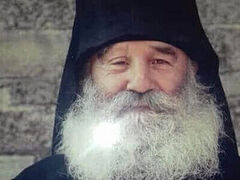—What is the view of the Orthodox Church on various systems of fitness regimens such as yoga, or the gymnastics of the Tibetan monks? Isn’t it essentially a temptation? And is it acceptable to practice fortune-telling?
—I have never met any document of the Bishop’s Council expressly stating the official position of the Russian Orthodox Church on these issues, but priests in their sermons would likely talk about them in a negative rather than positive light. The matter is that the Eastern practices currently advertised in fitness centers as physical exercise routines originated primarily as spiritual practices. In other words, it is about the meditation first and only later it is a physical regimen, supplementing meditation. It is the same in Orthodox ascetic practice: Our faith and prayers to Christ come first, followed next by the practice of fasting. For us, the practice of fasting is inseparable from our faith and from praying to Jesus Christ, our Lord.
As for fortune telling: Any fortune telling—reading coffee grounds, bird-reading, or even guessing on the Bible, is unacceptable. That is because by using these practices instead of studying the Law of God we resort to guessing—like, heads or tails. In exceptional cases, when the God’s will is not revealed to us but we are confronted with tough choices, we can use a rare and exceptional church practice of casting lots following a prayer. At the beginning of the twentieth century, His Holiness Patriarch Tikhon was selected by lot. However, deeply intense prayer preceded it; besides, that procedure was used to avoid any political intrigues and pressure from the Communist party.
—How can we get rid of deceit and stop making excuses by fooling ourselves and others?
—Truly, the question of sticking to the truth (when it is awkward to be truthful) is quite relevant for certain work teams. There is no direct answer to this question but a few appropriate sayings could be applied. According to the first saying, “satan is the father of lies” (cf. John 8:44). That is, any lie is malevolent and rooted in evil. That’s why gloating is akin to experiencing joy for an unseemly reason. Woe to the man who knows how to smile gloatingly but never smiles out of joy. Consequently, any deception suggests some kind of duplicity, but every situation should be considered on a stand-alone basis. There are specific situations that have to do with interpersonal relations. For example, how can a woman be told about her brother’s death if she loved him so much it could give her a heart attack? “Maybe we shouldn’t say anything at all?” her relatives might wonder. In one such case, the relatives took a risk, shared the news, and everything went very much the other way around. One elderly lady, as soon as she was told of her brother’s death, breathed a sigh of relief and said calmly, “He came to the end of his ordeal,” reacting to the sad news in a perfectly normal way, for we are all going to die one day. In some other cases, it is probably best to come up with an alternative solution; but it is equally important to avoid lies, deceit, or fabrications of any kind. If possible, it is best to politely evade the issue.
There is another saying: if you can’t say “no” you are an evil-doer. In some instances, it is necessary to firmly say, “No, I can’t answer this question.”
—How can we discern between demonic possession and mental illness? Can a person be possessed by heredity?
—Not a only person’s appearance can bely his illness; it is important to figure out why he is sick. It is not uncommon that by outward signs and his behavior, a man seems possessed: He hears voices, has convulsions whenever he comes to church, he talks to himself or growls. That’s when everyone avoids him saying, “A demon’s taken hold of him!” There are times when someone may have an exhausted nervous system, or is on the verge of a nervous breakdown, and simply needs the intervention of a psychotherapist. But then there may be another person who acts perfectly normal with no obvious signs of being possessed, while in fact he is. Let’s say, some atheist, acting relentlessly against Christians and feeling unprovoked hatred towards the Church and its clergymen, is willing to do anything in his ability to smite them. He can even suffer loss of appetite and sleep from having spent all his energy on his fight with any manifestation of piety.
In order to tell the difference between mental disorder and demonic possession, one must get to the root of the matter, the key factors, and understand what this person is possessed with. Typically, a man falls voluntarily and consciously into a trap set up by demons: He might be serving some demonic cause, or visiting a psychic “healer”, or voluntarily taking part in occult practices to the point of experiencing certain side effects. Man plays with fire, selling his soul to the devil for nothing, even paying money for the services of a fortune-teller, or attending an occult séance and then deciding to act as a medium himself. Then it’s no wonder the demon doesn’t leave him.
If we are talking about mental disorders, it simply requires a professional medical evaluation. Unfortunately, the collision of the religious faithful with psychotherapists, especially secular-minded ones, leads to contradictory interpretations of borderline symptoms. As we know, a physiological disease can be directly linked with a mental disorder. There is a saying: “Stress can kill you.” Mental breakdowns can lead to somatic disorder—just as demonic possession may lead to physical disease, certain kinds of cerebral damage, vision or hearing impairment, etc. Consequently, a patient in a borderline state, without a definitive diagnosis, should get a dual-track medical treatment strategy: His body must be treated for a physiological ailment with the help of specific medicines and treatment, plus he should receive spiritual healing at church through fasting, prayer, and, above all, confession. These two things cannot exist without each other. Even a visibly possessed person should come to church and pray to God, since his salvation is in the hands of the Lord.
—My niece keeps taking photos of her children next to markers at the graves of family members. Could this have consequences? There are evil forces out there.
A photo on its own can do neither good nor bad. In our modern times, photography has become such a mundane method to store memories that you oftentimes can’t even keep track of those who take photos and when. The question isn’t about where we are photographed: at the cemetery, at church, at a wedding, a meal, at home or at work. However, should we allow taking pictures of people without their consent? For example, the State of Israel issued laws allowing its citizens to assert the right to prohibit photographing them without their consent. The Russian Federation doesn’t have such a law, meaning that another person has the right to take a photo without our consent and later upload it on his social media accounts. We will never find out who will use these photos and how. There are all kinds of people out there and the thing isn’t about the existence of good and evil.
Clearly the powers of darkness, if we prompt them, can still deliver an attack, with or without photography. It has nothing to do with photography. The evil forces can cause harm to man if he spends his life away from God. In the mystery of Baptism, we ask the Lord that He banish all evil spirits. A baptized and church-going Christian should have no fear whatsoever—of someone sprinkling salt across the threshold or casting an evil spell, or other such nonsense. Anyone who attends church, confesses, and partakes of Holy Communion on a regular basis has absolutely nothing to fear. Let’s think about the story of Righteous Job: Satan himself comes to God asking to do evil things to this righteous man (cf. Job 1:6-12). If the prince of darkness had to ask permission from the Lord God, then those redeemed by the blood of Jesus Christ the Lamb of God from the bondage of the prince of evil should have far less reason to fear unless we willingly choose to fall into the devil’s trap. So, let’s try not to be frightened of someone snapping a photo or fear where those images might end up; it is nothing but nonsense.
—We have wooden crosses erected at a family gravesite. We decided to set up a stone monument instead, but what should we do with the crosses? They were blessed with holy water at the time they were made…
—There is no specific instruction manual that would clearly explain this in writing, none at all. Every parish and every Christian decides to their liking. There is a righteous tradition of burning the decayed wooden crosses out in the open, just as we burn worn paper icons or other church paraphernalia to dispose of them. We shouldn’t try to see any mystery here. Even if this cross was once blessed and sprinkled with holy water, like the icons, nothing lasts forever.
—How should we remember a woman and her unborn baby who died during childbirth? How should we write her name on the church commemoration note? Should we add her name with the child’s?
—By all means; this is a tragic, exclusive, and terribly painful experience. We should write it down and commemorate her using whatever name she was baptized with. All kinds of descriptions before names on prayer lists commonly used in Russian churches such as “the newly-departed”, “of blessed memory”, “with child”, or “in the military”, are of secondary importance. I know that some churches and monasteries ask the faithful to refrain from adding any descriptions, as they are irrelevant. It makes sense to ask: why do we write “a member of the military,” but not a “physician”? Is being a physician any worse? Maybe he died in the line of duty battling with coronavirus, and, so to speak, laid down his life for his friends (cf. John 15:13)? How about a teacher who had spent his life fighting for the spiritual health and upbringing of the next generation? Somehow it isn’t customary in Russia to add the name of trades in our church commemoration notes, so all other additional descriptions are of secondary importance.
—Does it matter how we rank names in the commemoration notes and books?
—It is absolutely irrelevant. When we add a name for commemoration in the books, what matters is the day we are to begin commemorating this person. The order of those mentioned in the submitted commemoration note is of no importance whatsoever. However, there is a pious tradition of beginning a commemoration list with the names of clergymen—for example, for the health and wellbeing of Metropolitan [name], then Protopresbyter [name], and Deacon [name], and only then adding the rest of the names. It doesn’t have any theological significance, and is more a matter of personal piety.







